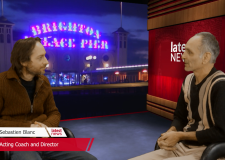Will Harris tries his hand with a life coach
Stop me if this sounds crazy, but there’s a little voice in my head and he’s telling me what to do. He’s not my conscience, before you ask. He’s not my moral compass, and no, he’s definitely not the devil. His name is Adam, he lives in my phone, and he is incessantly, insistently perky.
“Tell me,” says Adam, in measured tones, “three things you really value and appreciate about yourself.”
I stare at the phone. The speaker button is illuminated, and Adam’s disembodied voice has been floating around the room for the last 25 minutes, showering me with positive thoughts. It’s a strange feeling, sort of like I’ve been granted an audience with God. Or Shirley Temple. “The other day,” I say, after a considerable pause, “I found a vein on my bicep.”
This is not what Adam, who has been a life coach for six years, is looking for. His role as a coach is “to challenge people and hold them to account so they can change their life for the better.” This makes him two-parts therapist to one-part drill sergeant, with a liberal dash of motivational speaker and a frosted rim of genuinely nice bloke.
For the first half hour of our consultation, Adam gently teases out the things I like about my life, as well as some of the things I’d like to change. On the positive side, I speak about my friends, my job, this column. Then, when we turn our attention to the negative, I return time and again to the same issues. Work meetings. Talking to men. Could it be I have a problem with confidence?
“The other day, I found a vein on my bicep”
One by one, we work through the list of negative beliefs I hold about myself and turn them on their heads, creating positive affirmations that I will live by for the next seven days. “I worry too much about what others think of me” becomes “I’m worth getting to know”, and so on.
Over the next week, I am to weave my affirmations into my daily routine. Some people, Adam tells me, write them on post-its and stick them to their mirrors. Others hide theirs in cereal boxes, so they can recite them over breakfast (“What?” I ask. “Like snap, crackle, and ‘I’m FABULOUS’?”). The idea is, by regularly repeating positive statements, we can reprogram our brains into believing them. “No matter what has happened in the past,” says Adam, “people can choose to behave and think in different ways.”
“It all sounds very dubious to me,” says H, later in the pub. Having been the little voice in my head for the past 20 years, she’s not giving up the mantle without a fight. “You don’t need a life coach; you just need to strap on a pair.”
“I believe in what I have to contribute,” I affirm, through a mouthful of crisps. The strange thing is, for once, I do.





















